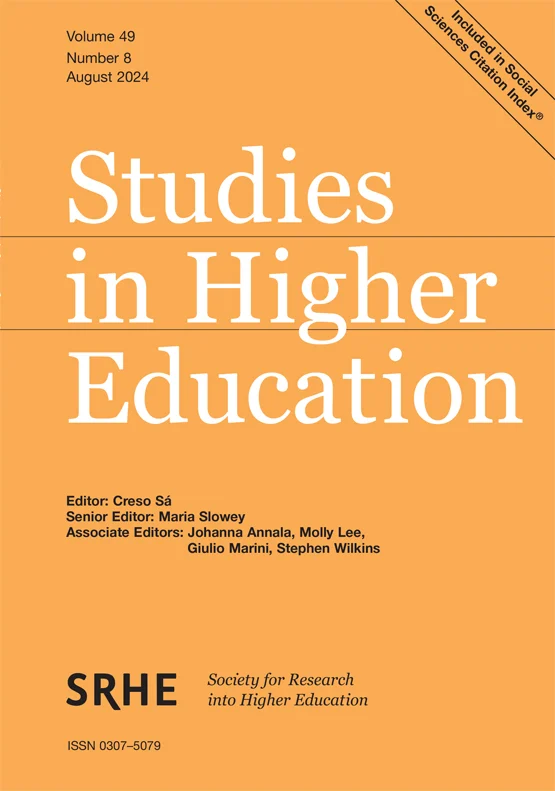Published by: Taylor & Francis
Frequency: Twelve issues per year
Print ISSN: 0307-5079
Online ISSN: 1470-174X
Studies in Higher Education
This journal has a wide ranging interest in higher education and the social and institutional contexts within which it takes place, but gives particular emphasis to education as practice, with a view to influencing its development.
Editor in Chief
Professor Creso Sá
Ontario Institute for Studies in Education, University of Toronto, Canada.
Senior Editor
Professor Maria Slowey
Higher Education Research Centre (HERC), Dublin City University, Ireland.
Associate Editors
Professor Luca Cattani
Department of Law, Politics and International Studies, University of Parma, Italy.
Dr Emma Harden-Wolfson
Department of Integrated Studies in Education (DISE), McGill University, Canada.
Professor Molly Lee
School of Educational Studies, Universiti Sains Malaysia, Penang, Malaysia.
Dr Giulio Marini
Department of Economics and Business, University of Catania, Italy.
Dr Christine Teelken
Vrije Universiteit Amsterdam, Netherlands.
Special issues Editors
Professor Kate Black
Newcastle Business School, Northumbria University, UK.
Professor Ming Cheng
Sheffield Institute of Education, Sheffield Hallam University, UK
Special Issues: Current Open Calls for Papers
Guest Editors:
Professor Patrick McGurk (Queen Mary University of London, UK)
Professor Joanne J. Zhang (Queen Mary University of London, UK)
Professor Denise Hawkes (Kings College London, UK)
Stef Thorne (University of the Arts London, UK)
Basil Safi (Cornell University David M. Einhorn Center for Community Engagement, USA)
Professor Pilar Aramburuzabala (Autonomous University of Madrid, Spain)
Student Knowledge Exchange (SKE) denotes a multidisciplinary, co-created, student-led approach to learning through real-world projects, run in collaboration with external partners and facilitators as well as educators (Cotton et al., 2024). The Knowledge Exchange literature has been primarily concerned with questions of business and community stakeholder engagement and university partnerships, including the model of the ‘civic university’, rather than the roles of students and their learning activities (Jungblut & O’Shea, 2023). SKE as an emergent field engages directly with fundamental pedagogical questions (Dismore et al., 2024), intersecting with debates around authentic learning, service-learning and community-engaged learning (Aramburuzabala et al., 2019; Pitchford, 2021; Welch & Saltmarsh, 2023), as well as critical scholarship on employability, entrepreneurial competence, co-creation and inclusive education (Bacigalupo et al., 2016; Filippou et al., 2025; Omland et al., 2025; Scandurra et al., 2024). This Special Issue will provide a precise conceptualisation of SKE, as well as a comprehensive international examination of the current state of knowledge of the various SKE practices and outcomes in the context of contemporary higher education debates.
We welcome both theoretical and empirical submissions that broadly address one or more of the following themes.
- SKE conceptualisation and positioning, including: originality of SKE as pedagogy; importance of multi-/inter-disciplinarity; innovations in learning and teaching.
- Diversity and evolution of SKE in contemporary context, including: different types and models of SKE; environmental drivers, such as societal-generational change and technological shifts; relationship of SKE to employability, entrepreneurship, beneficence and the promotion of social justice.
- Student participation, learning and inclusion in SKE, including: student roles and experience of SKE; inclusion, marginalisation and/or exclusion of students and other stakeholders; implications for civically-minded higher education policy/strategies.
- Outcomes and impact of SKE, including: cost-effectiveness and impact of different SKE models; what and how students learn through SKE and how they benefit; appropriate outcome measures of SKE and their relationship to conventional educational outcome measures; changing roles of stakeholders through SKE.
Timeline
- Abstract (up to 200 words) and proposal (max 1500 words) submission: 1 April 2026
- Abstract & proposal review decision: 31 May 2026
- Full manuscript (6000 to 8000 words) submission to guest editors: 1 April 2027
- Internal review decision by guest editors: 31 May 2027
- Manuscripts submission online for peer reviewing: 1 August 2028
- Expected publication of Special Issue: Spring 2029
We invite scholars across disciplines and geographies to join this dialogue. For questions and submissions, please contact Patrick McGurk at p.mcgurk@qmul.ac.uk.


